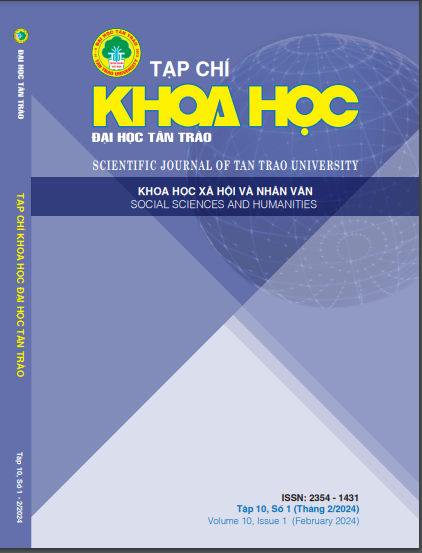LANGUAGE WITH EXPRESSING THE SPIRIT OF FEMINISM IN THE WORKS OF DO HOANG DIEU
DOI:
https://doi.org/10.51453/2354-1431/2024/1074Keywords:
Do Hoang Dieu, feminism, language, sexualityAbstract
Contemporary Vietnamese literature leaves its mark on female writers with their fierce writing style about gender equality. Many writers focus on this content and have left a strong mark in the hearts of readers, including Do Hoang Dieu. The spirit of feminism is a prominent aspect in all of her works. This article explores the contribution of language in expressing that spirit. Specifically, body language (sex language), mundane language - everyday life and elaborate language - beautiful. Do Hoang Dieu was very successful in using these types of languages to help express his ideological content well.
Downloads
References
Do Hoang Dieu. (2005), Sleep Shadows, Collection of short stories. Tre Publishing House, Ho Chi Minh City.
Do Hoang Dieu. (2016), Lam Vy, Novel. Tre Publishing House, Ho Chi Minh City.
Do Hoang Dieu. (2018), Dragon’s Back, Collection of Short Stories. Writers Association Publishing House, Hanoi.
Do Lai Thuy. (2004), Psychoanalysis and love, Information and Culture Publishing House, Hanoi.
Hoang Son. (2006), Sexuality seen in the East. Tre Publishing House, Ho Chi Minh City.
Nguyen Van Trung. (2021), Praise the body. Ho Chi Minh City General Publishing House.
Nguyen Van Trung. (2021), Language and body. Ho Chi Minh City General Publishing House.
Nguyen Hoang Dieu Thuy. (2015), Women with sleep paralysis in Do Hoang Dieu’s literature,
www.vnexpress.net
Tuan Anh. (2008).“Sexual aesthetics and the adventure of liberating female divinity in literature and art”. Song Huong Magazine, No. 236 (10).
Tran Dinh Su. (2023). Introduction to literary poetics. University of Education Publishing House, Hanoi.
Tran Huyen Sam. (2016). Feminism in France and contemporary Vietnamese novels. Women’s Publishing House, Hanoi.
Downloads
Published
How to Cite
Issue
Section
License

This work is licensed under a Creative Commons Attribution-ShareAlike 4.0 International License.
All articles published in SJTTU are licensed under a Creative Commons Attribution-ShareAlike 4.0 International (CC BY-SA) license. This means anyone is free to copy, transform, or redistribute articles for any lawful purpose in any medium, provided they give appropriate attribution to the original author(s) and SJTTU, link to the license, indicate if changes were made, and redistribute any derivative work under the same license.
Copyright on articles is retained by the respective author(s), without restrictions. A non-exclusive license is granted to SJTTU to publish the article and identify itself as its original publisher, along with the commercial right to include the article in a hardcopy issue for sale to libraries and individuals.
Although the conditions of the CC BY-SA license don't apply to authors (as the copyright holder of your article, you have no restrictions on your rights), by submitting to SJTTU, authors recognize the rights of readers, and must grant any third party the right to use their article to the extent provided by the license.


